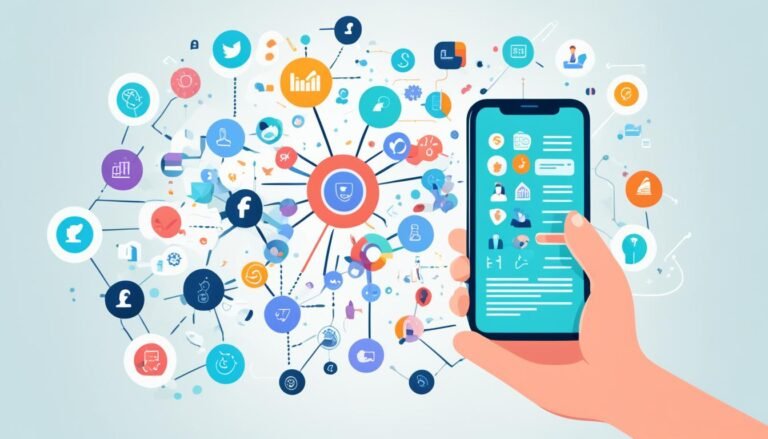AI in Online Market Research: How to Make It Work for You
Market research today can feel like a big task, with lots of data from surveys and focus groups. It’s slow and often leads to more questions than answers. But, what if you could use artificial intelligence (AI) to change that? Could AI be the key to unlocking insights that help your business grow?
This article will show you how to use AI in online market research. We’ll cover predictive analytics, sentiment analysis, customer segmentation, and competitive analysis. You’ll see real examples and learn how top brands are using AI to stay ahead.
Key Takeaways
- AI can automate data collection and analysis, saving businesses an average of 2 hours and 24 minutes per day.
- Predictive analytics and sentiment analysis powered by AI can provide valuable insights into consumer behavior and market trends.
- AI-driven customer segmentation and personalization can help businesses deliver a more tailored experience and improve customer loyalty.
- AI can assist in competitive analysis by monitoring competitor strategies and identifying opportunities for product differentiation.
- Integrating AI into online market research can lead to more efficient, accurate, and impactful decision-making.
Understanding AI in Market Research
AI has changed the game in market research, giving businesses a deeper look into what customers want and what trends are emerging. At the core, AI uses lots of customer data and advanced algorithms to find patterns and connections that were hidden before.
Data Feeding: Providing AI with Customer Data
To use AI in market research, you need to feed it with lots of customer data. This data can come from many places like competitor tweets, customer reviews, and social media. By giving the AI this data, it can start to analyze what customers are saying and how they feel.
Natural Language Processing: Analyzing Language and Sentiment
After getting the customer data, the AI uses natural language processing (NLP) to understand the language and feelings behind it. This lets the AI get the emotional and contextual parts of what customers are saying. It’s more than just looking at keywords to find out what customers really think and want.
Pattern Hunting: Identifying Trends and Connections
The AI uses machine learning algorithms to go through lots of customer data and find patterns and connections. This helps the AI find insights that might be hard for people to see. These insights can help businesses make better decisions and stay ahead in the market.
| Key Benefits of AI in Market Research | Potential Limitations |
|---|---|
|
|
As AI in market research grows, businesses need to be smart about using this tech. They should balance AI’s power with human knowledge to get the most out of it. This way, they can make better decisions and grow their businesses in a responsible way.
Real-World Applications of AI in Market Research
Artificial intelligence (AI) is changing the game in market research. It helps businesses understand and meet their customers’ needs better. AI is especially useful in predictive analytics for demand forecasting and sentiment analysis for customer feedback.
Predictive Analytics for Demand Forecasting
AI’s predictive analytics look at huge amounts of data to predict what customers will want. This helps companies plan better, spot new chances, and avoid running out of stock. ClickUp Brain, an AI tool, gives insights on market trends to help with decision-making. AI also creates detailed profiles of consumers by looking at their demographics, behavior, and buying history. This means companies can make marketing and products that really speak to their audience.
Sentiment Analysis for Customer Feedback
AI tools analyze online reviews, social media, and other feedback to understand what customers think. This lets businesses quickly fix issues, find ways to get better, and change their plans to meet customer needs. Netflix’s AI, for example, updates movie recommendations based on what users like to watch, making them more personal.
By using AI, companies can really get to know their market. They can make smarter choices and offer products and services that match what customers want and need.
| AI Application | Benefit |
|---|---|
| Predictive Analytics | Forecasting consumer demand to optimize supply chain and identify opportunities |
| Sentiment Analysis | Analyzing customer feedback to address concerns and improve product/service offerings |
| Consumer Profiling | Creating detailed consumer profiles to enable targeted marketing and personalization |
AI for Customer Segmentation and Personalization
Artificial intelligence (AI) has changed how we segment and personalize customers. It lets businesses give customers exactly what they want. By using AI analytics, companies can make detailed profiles of customers. These profiles include more than just basic info, like what they buy and how they act.
AI has made personalization a big win for companies. Studies show that more people are willing to pay more for services that feel made just for them. Thanks to AI, businesses can suggest products that fit what customers like, making them more likely to buy and stay loyal.
For example, emails that are made just for you get opened 26% more often. And when emails are made just for you, people click on the links inside 56.7% more. Platforms like Netflix and Spotify use AI to suggest shows and music that fit what you like, making up about 80% of their use.
| Metric | Increase |
|---|---|
| Consumers willing to pay more for personalized services | 77% |
| Personalized email subject line open rate | 26% higher |
| Personalized email click rate on content | 56.7% higher |
| Streaming hours via personalized recommendations on Netflix and Spotify | 80% |
Using AI for customer groups and personalization helps businesses make experiences that really speak to their audience. This leads to more loyal customers, better engagement, and shopping experiences that are just right.
The perks of using AI for customer groups and personalization are clear. Companies that use these methods see more people buying, keeping customers around longer, and being more loyal. As AI use in marketing grows, being able to offer hyper-personalized customer experiences will be key for businesses to stand out.
Competitive Analysis with AI
In today’s fast-paced business world, it’s key to stay ahead. AI tools are changing how companies check out their rivals. They look at lots of data to give insights on what others are doing with their strategies, prices, and products.
Monitoring Competitor Strategies and Pricing
AI tools help businesses keep an eye on their rivals. They look at customer feelings, financial info, social media, news, and market trends. This lets them spot important details fast.
AI can go through data much quicker than people. It finds patterns and predicts what might happen next. This can affect how a company stands out.
Identifying Opportunities for Product Differentiation
With AI insights, companies can make smart choices about their products and prices. They can see how they stack up against others. This helps them find ways to make their products stand out.
Sentiment analysis is key here. It shows what customers think and feel. This helps companies know what their customers want, keeping them ahead.
| Feature | Benefit |
|---|---|
| AI-powered competitor prediction | Analyzes vast amounts of competitor data like customer sentiment, financial reports, social media activities, press releases, and market trends. |
| Real-time analysis | AI can handle large data volumes from multiple sources, providing insights on consumer shifts, predicting market trends, and competitor moves. |
| Predictive analytics | Uses statistical algorithms to predict future events based on historical data, enabling proactive decision-making. |
| Sentiment analysis | Determines emotional tone in customer feedback, helping understand sentiments towards products, services, or brands. |
Using AI for competitive analysis gives businesses a big edge. It helps them keep an eye on rivals and find new ways to stand out. These tools are changing how companies do market research and plan their strategies.
AI in Online Market Research: How to Make It Work for You
AI has changed how businesses get customer insights. By using AI, companies can find a lot of valuable data and smart insights. This helps them make better decisions. To use AI well in your market research, knowing the best ways and strategies is key.
AI is great at looking at lots of data fast. It can find patterns and trends quickly. This means businesses can make faster and smarter choices, which helps their strategy.
AI also makes market research data better by fixing mistakes. This is important because wrong data can lead to bad decisions. It can also mean targeting the wrong audience and losing customers.
AI is also good at segmenting customers and making things more personal. It looks at what customers like and how they act. This helps businesses make experiences that really speak to their customers. This makes customers happier and more likely to buy more.
To use AI in market research well, you need to know what you want to achieve. You should also think about what data you need and pick the right AI tools. By doing this and always improving, businesses can use AI to get ahead in the market.
“AI is transforming the way we approach market research, enabling us to uncover insights that were previously hidden and make more informed, data-driven decisions.”
Using AI in market research has many benefits. It helps with analyzing data better and making sure it’s right. It also lets businesses make experiences that feel more personal to customers. By knowing how to use AI right, businesses can make their market research more accurate, efficient, and powerful.
AI-Powered Survey Design and Analysis
Today, AI is key for marketers. It saves time, money, and effort by automating data collection. AI can make survey questions that fit the topic, making surveys easier to design.
AI also looks at survey answers right away, giving deep insights. This AI-powered survey design and analysis helps businesses make surveys that are shorter and more fun. They get more people to finish the survey.
Creating Engaging and Relevant Survey Questions
With AI, you can make up to 10 survey prompts per hour, each up to 1,000 characters. It can make many types of questions, like multiple choice and open-text ones. Some users can even use Matrix/Rating Scale questions.
The preview of the survey shows the new questions. Users can customize the survey draft. This AI-generated survey questions feature makes surveys more interesting and relevant. It leads to more answers and better insights.
Real-Time Analysis of Survey Responses
AI tools can analyze behavior and intent like humans do. This helps businesses stay ahead by predicting market changes. AI finds patterns in big data to improve products and marketing.
This real-time survey response analysis helps human analysts too. Together, AI and humans make research better. This helps businesses grow and adapt to the market.
“AI cannot replace human research analysts due to the unique capabilities humans bring, such as empathy and creativity. However, the future of AI market research is expected to see innovations in price optimization, survey technology, and emotion AI tech for the customer experience sector.”
Fraud Detection in Market Research Data
In today’s digital world, making sure market research data is trustworthy is key for businesses. They need accurate insights to make smart choices. Luckily, AI has brought new tools to fight fraud and keep market research data reliable.
AI systems check data for fraud by looking for unusual patterns. They can go through huge amounts of data quickly, finding things humans might miss. Companies like SurveyMonkey use AI to spot fake answers, giving clients real insights for better decisions.
Using AI to fight fraud in market research has many benefits. According to the 2023 Currents report by DigitalOcean, 37% of participants increased their cybersecurity spending to acquire more advanced security software. This shows how important it is to protect data. AI helps businesses avoid losing money, keep customers’ trust, and make sure their market insights are correct.
“An organization forfeits an average of 5% of its yearly revenue to fraudulent activities annually, with a median financial impact of $117,000 occurring before the fraud is identified.”
AI is great at finding suspicious patterns, like odd transaction sizes or customer buying habits. In banking and e-commerce, AI watches for fraud in real-time. This helps stop financial losses right away.
AI is also a big help in online gaming and virtual economies. It catches fraud, like stolen credit card use or cheating in games.
As the digital world changes, we’ll need better fraud detection in market research data more and more. By using AI, businesses can protect their data, make smart choices, and keep their customers’ trust in a complex world.
Future Trends in AI-Driven Market Research
The market research world is changing fast, thanks to Artificial Intelligence (AI). Soon, we’ll see hyper-personalized customer insights, agile research, and analyzing data in many ways. All thanks to AI’s growing power.
Hyper-Personalized Customer Insights
AI will help market researchers dig deeper into customer data. By 2026, 65% of companies will use data fully to make decisions. This means they can make products and experiences just for each customer. AI’s predictive skills and learning ability will help businesses predict market trends and what customers want.
Agile Research Methodologies and Real-Time Analytics
AI will make market research faster and more efficient. It can do what takes weeks in just a few hours, without losing quality. This means businesses can quickly adapt to market changes. Real-time analytics will give companies the latest data, helping them make quick, smart decisions.
Multimodal Analysis: Beyond Text
AI will take market research beyond just looking at text. It will use Natural Language Processing (NLP) and Sentiment Analysis to understand human language better. Plus, it will look at facial expressions and tone of voice for a deeper look at what customers like.
As market research changes, companies that use AI will get ahead. They’ll get hyper-personalized insights, work quickly, and use many types of data. This will help them make products and experiences that really connect with their customers.
Conclusion
AI is changing how businesses learn about their customers. It helps companies understand customers better, stay ahead, and make smarter choices. AI uses predictive analytics and sentiment analysis to improve market research.
It also helps in segmenting customers and spotting fraud. This makes businesses more competitive.
In the future, AI will give us even more detailed insights. We’ll see faster and more flexible ways to analyze data. This will help companies understand what customers want and feel.
As a result, marketing will get better, products will improve, and customer relationships will grow. Businesses that use AI in market research will do well in a competitive world.
The future of AI in market research is bright. Those who invest in and learn about AI will succeed. Working together, market researchers and AI experts can unlock AI’s full power.
This will help businesses grow and succeed.
Source Links
- AI in Digital Marketing — The Complete Guide
- 3 Ways AI Can Support Your Marketing Team
- Market Research With AI: Optimization and Automation
- 20 Wide-Ranging Applications of AI in Market Research
- How to Use AI for Market Research Tasks – LivePlan
- How to Use AI for Market Research (Use Cases & Tools)
- AI in Market Research: Use Cases, Architecture, and Benefits
- Maximizing Engagement with AI Personalization: Strategies for the Modern Marketer
- AI Customer Segmentation Strategies | Mailchimp
- Can AI Segment Your Customers? I Ran This Experiment to Find Out
- Accurately predict your competitor’s next move with AI
- The Ultimate Guide to Competitive Analysis with GPT and AI
- How to Use AI for Consumer Research: Ideas to Streamline Your Insights Generation
- How to Use AI to Accomplish 10 Common Business and Marketing Tasks
- AI in Market Research: How Can You Put AI to Work for You
- Build Surveys with AI | SurveyMonkey
- AI Market Research: Tools, Techniques, and Trends – Rock Content
- Understanding AI Fraud Detection and Prevention Strategies | DigitalOcean
- How Is AI Used in Fraud Detection?
- How to Combine Machine Learning and Human Intelligence for Better Fraud Detection
- AI-Driven Approach in Creating and Conducting Market Research
- The Future Now: How AI Market Research Tools Are Changing the Game
- How to Use AI For Market Research (and FAQs)
- How to Leverage AI in Market Research







